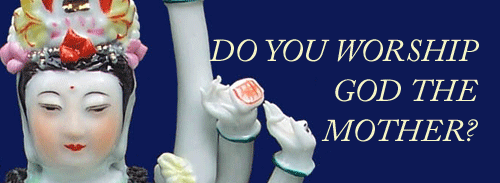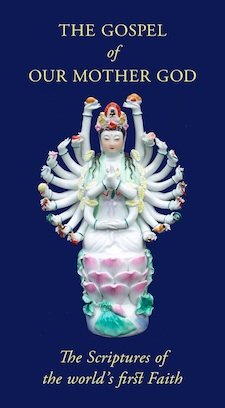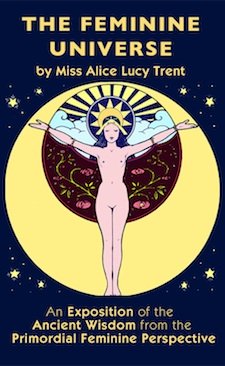Christianity, Original Sin,
and the Love of our Mother God
In Christianity, original sin is a key doctrine. It denotes the fundamental flaw in the human soul from which no human soul can be exempt (for it is the very condition of her fallen existence). Indeed, as we have argued in our page on the Blessed Virgin Mary, the Catholic doctrine of the Immaculate Conception (that Mary was conceived without original sin) logically implies that Mary is not a human being but is Divine.
That, however, is another matter.
Since the worship of Our Mother God is not Christianity, original sin might be expected not to play a direct role in our thinking; and indeed it does not, in quite those terms.
What we need to understand is that every legitimate religion accepts that there is a fundamental flaw in the human condition. If there were not, we should not require "religion" since we should already be in a state of Perfect Union, or "nirvana".
Some New Age or "Neo-Pagan" religions, and even some forms of ultra-modernist pseudo-Christianity, may deny the flawed or fallen state of humanity; but it must be understood that such a denial has its roots in the secular humanism of the post-Renaissance world, not in any authentic religious understanding.
The notion of "human perfectibility", beloved of modern societies, is inherently unorthodox. The human state is imperfect by definition. If it ceased to be imperfect it would ipso facto have ceased to be human. The only way a maid may become perfect is by transcending the human state.
In Christianity, original sin is the name given to this Truth, but the doctrine is universal to every orthodox religion. However, different religions have different terms and slightly different perspectives on the fundamental human flaw. In Christianity, original sin is the name of this concept, in Buddhism it is dukkha or "suffering" seen as an essential condition (not an accident) of samsaric existence.
The Western concept – in Christianity, original sin – tends to stress the "moral" or volentive aspect, while the Eastern concept (including that of the ancient Greeks) tends to stress the sapiential. In other words, the West tends to regard the human flaw as essentially "sin" while the East tends to regard it as essentially "folly" or "ignorance".
It should be understood that this is a question of perspective rather than of doctrine (the Christian tendency to over-doctrinalization can be a barrier to understanding here).
It will be readily seen that the volentive, or "sin" perspective corresponds to the Path of Love, focusing on an act of willful and disobedient separation from our Beloved Mother, while the sapiential or "ignorance" perspective corresponds to the Path of Light, seeing the Human Flaw as essentially the loss of our integral Knowledge of the Divine.
Each is the expression of the same Truth relative to a particular path, and in practice all religions incorporate both perspectives, whichever one may receive the primary doctrinal emphasis.
In Filianic doctrine both aspects are given due importance. The perspectives of Buddhism and Christianity – original sin and dukkha respectively – are both recognized by Flianists in the term khear, or kear.
The word means a gap or chasm, and also a crack or flaw. As it says in the note on The Secret of the World, a fundamental Filianic Scripture dealing with khear:
The word khear means an abyss, but also a crack or gap. The fundamental "khear" is spoken of in the second chapter of the Mythos of the Divine Maid: 2 For a terrible abyss had opened to lie between the world and She, and Her creatures could not look upon Her brightness.Here we see that khear is associated with maid's inability to look upon the Solar Mother: thus her loss of contact with Pure Intellect as well as her self-estrangement from the Maternal Love.It was precisely to "bridge" this abyss that the Daughter was born.
And since the macrocosm of the Total Cosmos is reflected in the microcosm of maid, this Abyss, or khear, is found in every human heart, where it is at once that which separates us from Our Mother God and the fundamental "crack" or flaw in our souls.
The fundamental statement of Filianic belief, the Filianic Creed stresses the volentive aspect specifically
I believe that I was made a perfect creatureTo this extent it may be seem somewhat equivalent to what is found in Christianity original sin and the volentive perspective; but the sapiential or "Light" perspective is inherent throughout.
and at the dawn of time my soul did turn
from the Perfection of existence
in the infirmity of her sovereign will:
And through this fault do I suffer
the limitation of imperfect being.
From the Filianic point of view, another question also arises. In Christianity, original sin gives rise to the concept of the Immaculate Conception in the case of Our Lady. Is the term "Immaculate Conception" applicable to the Daughter in Filianism? It is not a term that we use: but since She is separate from the Mother, is She "sinless or sinful"? Ignorant or possessed of Pure Intellect?
Clearly the Daughter cannot be sinful, nor is she subject to the illusion and ignorance of fallen creatures. She is immaculate, and yet at a certain point, she took khear upon herself:
16 And the Mother of All Things removed the Divine light from Her Daughter, and blessing Her, sent Her forth, saying: Go hence from here, beloved Daughter, for You may no longer look upon Me.She voluntarily suffers "the limitation of imperfect being"; her eyes can no longer look upon the Mother. Yet this is not done "in the infirmity of Her sovereign will", but in the perfection of Her sovereign will. Her soul is not flawed, even though she stands on the other side of the macrocosmic khear or abyss. her knowledge remains perfect because Her own Lesser Light is still the Light of the Mother.
Thus, khear may also be seen as an existential state that is neither sin nor ignorance, but only for the soul that has transcended humanity, or for She of Whom we say:
I believe that through Her deathFor the Filianist, the Love Perspective normally takes precedence over the Light Perspective because it is in the Love of the Daughter that we find our salvation, but in truth the two are never separate, for as She tells us:
the fault of my soul shall perish,
And I believe, through Her triumphant life,
My soul shall rise renewed in her perfection
that she may return to eternal communion
with the one eternal Dea.
...perfect love is perfect knowledge and perfect knowledge is perfect love.Through meditation and austerity one may pursue the Path of Wisdom, or through simple and pleasant devotion to the most beautiful Being in the universe, we may allow Our Lady to guide us on the Path of Love.
See also:
Original Sin and the Snake in Filianism
Read your Bible: The Gospel of Our Mother God
Please support the Chapel of Our Mother God
Send Questions or Comments on Christianity Original Sin and the Love of Our Mother God
Chapel of Our Mother God Homepage
All written material at the Chapel of Our Mother God is copyright. Should you wish to reproduce any portion please contact us for permission.
YouTube or Facebook
This section:
Fundamental Beliefs
A complete guide to the faith of God the Mother
FILIANIC SCRIPTURES
Gospel of Our Mother God
The Gospel of Our Mother God is a collection of inspirational texts, prayers and daily inspiration for the Mother-Faith devotee or household.
The Feminine Universe
The Other Philosophy
Everything you have ever heard comes out of the patriarchal world-view. Its materialism, its religion, even its feminism. Here is the other way of seeing the world; the natural way: the way that everyone saw things before patriarchy and will again when patriarchy is long forgotten.


